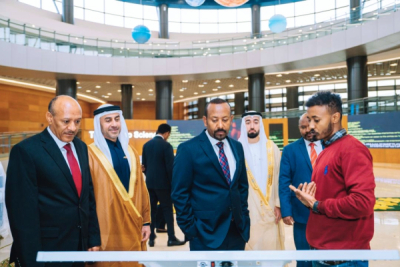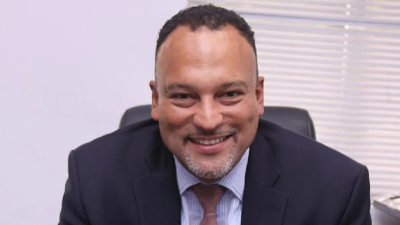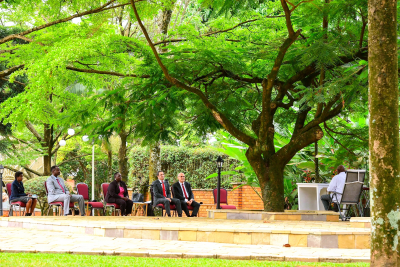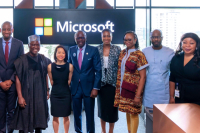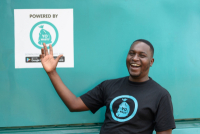With a passion for emerging technologies like the Internet of Things, artificial intelligence, robotics, embedded systems, and industrial automation, he designs innovative solutions that drive efficiency and safety improvements for businesses.
Jeslone Lukisa (photo) is a Congolese inventor and entrepreneur, serving as the co-founder and CEO of Smaraf, a technology company established in 2018. Smaraf specializes in engineering, with a strong emphasis on security systems and technological integration.
The company offers a wide array of services, including the sales, installation, and maintenance of video surveillance systems, access control, alarms, fire systems, GPS trackers, electric fences, drones, IT solutions, telecommunications, and the Internet of Things (IoT). Smaraf also provides training in its areas of expertise.
Among the innovative solutions developed by Smaraf are the Smaraf Asset Checking Table, Fuel Management System, and Driver Monitoring System. The Smaraf Asset Checking Table leverages radio frequency identification technology to help businesses track and verify their laptops, optimizing IT asset management.
The Fuel Management System is designed to monitor and enhance fuel usage, providing effective oversight and optimization to help industries improve efficiency and profitability. Meanwhile, the Driver Monitoring System employs vision and artificial intelligence to analyze driver behavior in real time, helping to prevent accidents caused by drowsiness, distraction, and other hazardous practices.
Jeslone Lukisa holds an engineering degree in electromechanics from the University of Kolwezi, which he obtained in 2020. Since 2021, Smaraf takes part in the Pan-African Robotics Competition. His team, Smaraf Eduk, secured second place in both 2021 and 2022, and won the competition in 2023. They are currently participating in the final phase of the 2024 edition, which began in Dakar on Monday, July 22, and will conclude on Saturday, July 27.
Melchior Koba
Kemitt, Egypt's top e-commerce platform for furniture and home accessories, has expanded into Saudi Arabia following a recent undisclosed funding round, according to a press release dated July 22.
Founded in 2017, Kemitt connects product and furniture designers with consumers, managing manufacturing, overheads, and last-mile logistics. The platform offers on-demand manufacturing and 7-12 day delivery services.
The recent funding supports Kemitt’s growth plans, including technology upgrades, product expansion, local partnerships, and its Saudi entry.
In the face of the digital revolution, African nations are ramping up initiatives to equip their populations, particularly young people, with essential digital skills. Mastering these competencies is becoming increasingly indispensable in today's world.
On Tuesday, July 23, Ethiopian Prime Minister Abiy Ahmed (photo, center) launched the "5 Million Ethiopian Coders" program. Supported by the United Arab Emirates, this initiative aims to provide digital training to 5 million young Ethiopians, including 50% women, by 2026.
The training program focuses on areas such as programming, Android app development, data science, and fundamental digital skills in artificial intelligence. It will last between 6 and 7 weeks and will culminate in certification for participants.
"Ethiopia has hope through a forward-thinking youth population. The 5 Million Ethiopian Coders Initiative we launch today is a great opportunity and I call upon everyone to encourage the youth to register for the program, gain skills, and acquire international certification," wrote Prime Minister Abiy Ahmed on X (Formerly Twitter).
This initiative is an adapted version of the "One Million Arab Coders" program conducted in Dubai and initiated at the 2017 World Economic Forum by Sheikh Mohammed Bin Rashid Al Maktoum, Vice President, Prime Minister, and Ruler of Dubai. The Ethiopian version of the program is part of the "Digital Ethiopia 2025" plan, aimed at leveraging digital opportunities to propel the country towards a knowledge and innovation-based economy.
With over 128 million inhabitants, a significant portion of whom are young, Ethiopia faces a digital divide that prevents its population from reaping the benefits of digital growth. In the era of the technological revolution, the country must equip this young generation with the necessary skills for future jobs.
Adoni Conrad Quenum
Cofinity Group, a 15-year veteran in the data center market, has signed strategic partnership agreements with Africa's largest data center operators, the group announced on July 23.
They include PAIX Data Centres, Rack Centre, Raxio, and Digital Realty's African subsidiaries iColo, Teraco, and Digital Realty Nigeria. These data center providers account for over 75% of Sub-Saharan Africa's GDP.
Cofinity’s extensive experience and relationships with these operators offer significant opportunities for enterprises seeking quality colocation data center solutions in Africa.
The Data Governance in Africa initiative has introduced the “Think Like an Investor” accelerator program, inviting African innovators to submit their digital social innovations for tailored training support.
The program targets data-driven startups and small to medium-sized enterprises in South Africa, Botswana, Tanzania, Zambia, Namibia, Kenya, and Senegal. It aims to foster a human-centric data economy in Africa.
Applications close on August 4.
The adoption of technologies such as AI in health interventions signals progress towards modernizing Africa's health infrastructure. This not only helps in fighting diseases but also positions Africa as a growing hub for technological innovation.
President Yoweri Museveni met with Israeli businessmen Israel Green and Koby Shushan to discuss innovative projects for Uganda, the State House Uganda announced on July 18. The meeting focused on using Artificial Intelligence (AI) through Malera Technologies Limited to combat malaria.
President Museveni met Israeli business leaders Israel Green & Koby Shushan at Nakasero State Lodge. They discussed; Combating Malaria with AI technologies, enhancing tourism with the Ruwenzori Cable Car project & Launching a Ka-Band satellite for rural connectivity. pic.twitter.com/uRly05h2HU
— State House Uganda (@StateHouseUg) July 18, 2024
The initiative will employ the Sterile Insect Technique (SIT), an environmentally friendly pest control method that involves large-scale rearing of the target pest followed by sterilization using radiation. SIT has proven successful in countries like Israel and the United States, and it has been approved by Uganda's Ministry of Health.
The discussions covered both the project's budget and timeline. President Museveni directed the immediate allocation of a portion of the current budget towards the project, with additional funding to come from Israel's support program. A follow-up meeting with the Ministry of Finance will delve deeper into financing options.
The World Malaria Report 2020 by the WHO shows that Sub-Saharan Africa bears a disproportionate malaria burden, with 95% of cases and 96% of deaths globally in 2020. In Uganda, malaria is the leading cause of illness and death, particularly affecting children under five, according to the Ministry of Health's National Malaria Control program.
This move aligns with the regional strategy for malaria elimination endorsed by the Government of Uganda (GoU). The project reflects a strategic approach to leveraging technology and innovation for sustainable development.
Hikmatu Bilali
Several global technology companies are increasingly viewing Nigeria as a strategic hub for their African expansion, particularly in the West African sub-region.
American tech giant Microsoft has decided to reduce its presence in Nigeria. According to a Techcabal article published on Friday, July 19, "Microsoft will reduce its office space at the Kings Tower building in Ikoyi from six floors to two, suggesting a scaleback in its Nigerian operations."
This decision follows a wave of layoffs in its engineering team in May and July 2024. Additionally, Microsoft has announced the closure of its African Development Center, which was inaugurated in March 2022 in Lagos. The center aimed to develop technological and engineering solutions for Africa and the world.
"While we have made the difficult decision to close the Africa Development Centre in Nigeria, we want to emphasize that this move does not diminish our commitment to Nigeria and the region," Microsoft explained.
The reduction of Microsoft's activities in Nigeria can be attributed to the economic instability in the country, marked by the depreciation of the local currency and the accelerating rise in prices. Many companies operating in the country are reorganizing their presence to cope with this economic climate.
Meta, the parent company of Facebook and WhatsApp, is following a similar path. After laying off about thirty employees from its Nigerian team, the Menlo Park firm indicated it is reassessing its office spaces to ensure they meet the company's needs.
Adoni Conrad Quenum
This startup's name translates to "save" in Moore, a widely spoken language in Burkina Faso. Its goal is to address parcel delivery issues across various localities in the country.
Faangué is a technological solution developed by Kafyka Group, a company based in Burkina Faso. It allows users to order domestic gas delivery with just a few clicks. The startup, founded in 2023 by Brice Clovis Kaboré, is located in Ouagadougou.
According to Kaboré, Faangué "aims to create jobs, enhance the delivery profession through the use of ICT, establish a uniform delivery price throughout Burkina Faso, encourage the population to integrate digital aspects into their daily habits, and assist the government in achieving its objectives."
The app is currently available exclusively on Android. After downloading, users can create an account to access various services. To order a gas cylinder, they simply select one of the many merchants listed on the platform, choose the desired cylinder, and confirm their order. Before finalizing the order, users can review an invoice that details the product price, delivery fees, and information about the delivery person.
In addition to gas delivery, users can hire the startup's couriers for errands. The app highlights nearby couriers based on the user's location. Faangué provides an estimate of the distance in kilometers between the user and available couriers, allowing users to select one for their errands.
The startup aims to create approximately 200 permanent jobs and over 5,000 part-time delivery positions for various products across Burkina Faso. It operates in several major cities, including Ouagadougou, Bobo-Dioulasso, and Koudougou.
Adoni Conrad Quenum
A passionate advocate for tackling environmental issues in Africa, he leverages his technical expertise to bridge the gap between independent waste collectors and businesses/households.
Martin Tumusiime (photo) is a Ugandan computer scientist and tech entrepreneur, known for founding and serving as the CEO of Yo-Waste, an innovative technology-based waste management company. Established in 2018, Yo-Waste aims to transform waste collection and management in Africa through advanced solutions.
Yo-Waste offers an application that connects residential and commercial clients with local waste collectors, enabling users to quickly find nearby waste services. Once the waste is collected, Yo-Waste partners with a network of collaborators to dispose of, recycle, repurpose, or convert it into energy.
"We had some people who used to collect our garbage, but it would take at least a week. Now with Yo-Waste, it takes only three days. The app's efficiency not only ensures timely waste disposal but also prevents waste from being scattered by wind and vultures, promoting cleaner surroundings," explains Martin Tumusiime.
In addition to Yo-Waste, Tumusiime founded UgTechMag, a technology magazine that provides guides and advice on tech products and services for audiences in Uganda, Kenya, Nigeria, and beyond.
Tumusiime holds a degree in computer science from Makerere University, which he obtained in 2020. From 2022 to 2023, he worked as a consultant for the German International Development Cooperation Agency (GIZ), where he managed a team that developed a robust waste collection application for Gulu City in collaboration with the Gulu City Council.
Melchior Koba
Digital progress is critical for Africa's development, providing numerous benefits to the broader economic landscape. Efforts to increase internet penetration in Africa are vital for connecting rural communities, enhancing social outcomes, fostering economic growth, and improving governance.
Liberian President Joseph Nyuma Boakai, Sr. held a virtual meeting with Elon Musk, entrepreneur and CEO of SpaceX, the operator of Starlink. The Executive Mansion announced the meeting in a release dated July 21.
During the meeting, President Boakai emphasized the value of such engagements for building long-term relationships and improving Liberia’s key sectors through technology. He highlighted the potential of tech collaborations to enhance service delivery and support Liberia’s youth.
Musk discussed the Starlink program’s impact on education and healthcare, noting how improved internet access could benefit rural communities. He expressed support for advancing these initiatives while President Boakai welcomed the discussion as a significant step in fostering international partnerships and invited Musk to visit Liberia.
According to Datareportal, as of 2024, Liberia has about 1.65 million internet users, representing 30.1 % of the total population, showing a notable increase from previous years. The country also has around 859,000 active social media users, indicating growing engagement and connectivity among its citizens.
This discussion represents a crucial step in enhancing international partnerships and harnessing technological innovation, aligning with the Government’s ARREST (Agriculture, Roads, Rule of Law, Education, Sanitation, & Tourism) Agenda.
Hikmatu Bilali
More...
The Economic Community of West African States (ECOWAS) has announced its Cybersecurity Hackathon, inviting participants to showcase their skills and tackle real-world cybersecurity challenges.
Organized by ECOWAS, Nigeria’s Federal Ministry of Communications, Innovation and Digital Economy, and the National Information Technology Development Agency (NITDA), the Hackathon is a yearly ethical hacking competition that unites top cybersecurity talents from across ECOWAS. It offers a distinct platform to demonstrate skills, foster knowledge sharing, and advance excellence in cybersecurity.
Registration closes by August 5.
For a continent experiencing a digital boom, hosting its own data becomes essential. Local data centers offer not just independence, but also enhanced security and control over sensitive information.
Consulting and management firm Essor Services announced plans to launch a data center in Burkina Faso, partnering with Costa Rican clean energy company Kaia Energy. The initiative was discussed on July 22nd with Aminata Zerbo/Sabane (photo,center), Minister of Digital Transition, Posts, and Electronic Communications.
"We presented this project to the Minister, who recognized it as a critical need for Burkina Faso's development. She expressed strong support for the initiative," said Fidèle Rinsinda Komboigo, CEO of Essor Services.
The data center, powered by a 12-megawatt waste-to-energy plant, will process, host, and transfer data internationally. Completion is targeted for November 2025.
This project aligns with the Burkinabe government's "digitalization dynamic," aiming to integrate digital technology across sectors for social and economic progress. For Komboigo, it is Essor Services’s modest contribution to the implementation of Burkina Faso's digital economy policy.
The data center will not only reduce reliance on foreign data infrastructure but also enhance national data security. Furthermore, by utilizing waste for energy generation, the project promotes sustainable practices, waste management, and local job creation.
Samira Njoya
With a track record at international telecommunications and media companies, she brings a wealth of experience to developing innovative solutions in fintech, financial education, and online learning.
Nancy Matimu is a seasoned entrepreneur and professional in the fintech and business sectors. In 2018, she founded Serrari Group, a company focused on fostering growth and financial freedom in Africa. Since 2023, she has served as the President and CEO, leading the group's innovation and operations.
Serrari Group is a technology platform designed to drive growth in Africa through fintech and edtech. The company develops solutions that empower individuals and professionals to achieve their goals through online education, financial literacy, quality financial planning and management, as well as tools for creating, growing, preserving, and managing wealth and succession.
The mission of Serrari Group is to "create the easiest, simplest, and most versatile online education platform, financial literacy platform, and a super aggregator Digital Financial Services marketplace & payments platform using a network of platforms for the smart investor (individuals, investment groups, SMBs, families, and the diaspora)," as stated on the company's LinkedIn page. Serrari Group operates under the brands Serrari FinEd, Serrari Fintech, Serrari Advisory, and Serrari Media.
Nancy Matimu holds a bachelor’s degree in environmental studies with a specialization in planning and management, which she obtained in 1998 from Kenyatta University. She earned a postgraduate diploma in marketing in 2009 from The Chartered Institute of Marketing and graduated with a master’s degree in strategic management from Strathmore University in 2011.
Before her current role, Matimu worked at several prominent organizations. From 2008 to 2017, she held various positions at Safaricom, including Director of Safaricom Home and Content, Director of Consumer Products and Services, Director of Internet and Content, and Director of Enterprise Products and Innovation.
In 2018, she was appointed Director of Digital and Marketing at HFC Kenya, a financial services institution. The following year, she became Vice President and Head of Market Development for Sub-Saharan Africa at MasterCard. From 2020 to 2023, she served as Managing Director for Kenya at MultiChoice Africa.
Melchior Koba
Information and communication technologies (ICT) are now an essential part of modern education systems. An international organization headquartered in Tunisia is backing government initiatives to further integrate ICT into schools.
The Arab League Educational, Cultural and Scientific Organization (ALECSO) announced on Friday the donation of 2,000 tablets and 20 computers to Tunisia. This initiative aims to bridge the digital divide in education by equipping students and teachers from low- and middle-income communities with internet-connected devices.
The breakdown of the donation allocates 1,500 tablets and 15 laptops to the Ministry of National Education, while the Ministry of Family, Women, Children, and the Elderly will receive 500 tablets and 5 laptops.
Mohamed El Jemni, ALECSO's Director of the ICT Department and project coordinator, reaffirmed the organization's dedication to fostering digital solidarity. He emphasized ALECSO's commitment to ensuring equal access to learning opportunities and supporting countries in navigating the current global challenges and significant digital transformations.
This donation aligns with the growing importance of information and communication technologies (ICT) in education. Stakeholders across the educational spectrum are increasingly embracing these tools to enhance the quality of learning. Tunisian authorities are also actively pursuing similar initiatives, including the implementation of a digital strategy within the Ministry of National Education.
Adoni Conrad Quenum




